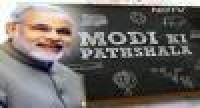100 Days of Modi

The performance of the Narendra Modi government during the last hundred days has been abundantly dissected in the print and electronic media. While the Opposition appears to suffer from the crab mentality (if we couldn’t do it, neither should you) the role of the media in analysing and assessing the first 100 days deserves scrutiny.
As an unbiased observer who has no political leanings, I think the print media scores when it comes to objectivity and issue-based criticism of the ruling dispensation. The editorials in national dailies and magazines have rightly criticised the government on the lack of radical reforms and continued delays in infrastructure projects, saying that the recent increase in GDP could well be a result, not of the government’s efforts, but of falling international crude and fertilizer prices, low interest rates by the US Fed, and overall growth in the global GDP.
The television debates, however, bordered on destructive criticism. The most reputed channels have adopted the easy route of cherry picking controversial remarks and petty issues to be dissected endlessly, even at the cost of sounding like a raucous record that keeps playing over and over again.
Take, for example, the recent ‘Hindu vs. Hindi’ remark by the Minorities Affairs Minister Najma Heptulla. Congress leader Manish Tiwari said, "We respect Najmaji a lot, but it would be better if she reads the Constitution. The Constitution mentions 'Bharat' and going by that, every citizen of the country is a 'Bharatiya', and not Hindu.”
This is sensible condemnation, but did the remark by Ms Heptulla deserve an endless discussion on some television channels? With due respect to Najma Heptulla, does a comment from someone who is not exactly in the driver’s seat, warrant a dissection on prime time? Finally, after the lady clarified that she had been misquoted - even though the reporter stood by the interview - was it necessary to drag out the issue? And, who gained by this controversy?
Take the recent rumour about the alleged misconduct of Pankaj Singh, the son of Home Minister, Rajnath Singh. When the rumour mills had the media salivating for more, the PMO released a statement saying, “The reports are plain lies, motivated and constitute a malicious attempt at character assassination and tarnishing the government’s image.”
After the Home Minister’s clarification, anchor Karan Thapar, on Headlines Today, conducted a debate on the basis of this rumour in a show called ‘To the Point’. The ticker on the screen gave us tabloid-ish headlines – ‘Whispers hit the saffron top brass’, ‘Rajnath isolated in the party’. According to Thapar, “The BJP comes back to squabbling, screaming and scratching at each other. Has this rumour shaken the faith of the people?”
Was it that bad?
One of the panelists, Zoya Hasan, Professor of Political Science, felt that the way the rumour had exploded and the way it was catching attention was a great media story.
Really? I doubt if a great media story is based on rumours and speculation.
Finally, unlike the print media, there was a lot of hue and cry on television about Modi’s interaction with school children on Teachers’ Day. Undeniably, the event was a political masterstroke with Modi engaging with future voters. On September 5, while most schools were abuzz with excitement, NDTV debated the issue on prime time in ‘Modi ki Pathshaala’. The ticker on the news had the following captions. “Inspirational or Dictatorial?” and “Teachers’ Day or Modi’s Day?”
The narrative was coloured by unnecessary politicisation of the issue. Why did Modi speak on Teachers’ Day when he should have spoken on Children’s Day? Why didn’t he say something different? Why did he not talk about teachers’ salaries? Why didn’t he plan it better?
In a debate, the political advisor to the Chief Minister of Bihar, Pavan Verma, felt that Modi should have recorded the message instead of having a live chat. According to him, “If Modi wants to be chacha Modi, he should have planned better.” Finally, all the panelists, barring one, felt that the timing of the address was not right, and that a joyous occasion of song and dance had been rendered a solemn affair by Modi.
The children of the nation gave a fitting reply to the cynical television media and the crab Mentality of the Opposition by turning out in huge numbers and participating enthusiastically. Barring a few, the majority of the teachers and children across the nation felt happy interacting with their PM for the first time. Teachers in Gurgaon felt that this interaction should be an annual affair on Teachers’ Day.
In view of the above ground realities, what message did we give to our young television viewers? Is President Obama criticised endlessly on national television when he talks to children in his country?
Perhaps the different between the print media and television is that it all boils down to grabbing viewers. In an interesting article in The Times of India, ‘Need for a new Opposition’ Santosh Desai says, “It is only through genuine reflection that the opposition can create a meaningful role for itself. Tired slogans about secularism and inclusiveness have run their course, not because the ideas are irrelevant in some form, but because these have been cynically used.”
The same, I think, holds true for some sections of the television media. Moreover, debates on inconsequential issues for the sake of opposing are unlikely to help the nation. This is not to say that the government should not be questioned. It should be questioned and criticised but on substantive issues, but not on trivial issues of inconsequential national interest.
Objective Analysis:
1. Modi is Acting Like an Economic Nationalist by Vetoing WTO Agreement
2. Indian economy warms in after-glow of Modi's triumph
3. Cautious optimism is the verdict on PM Narendra Modi’s 100 days
Nitpicking:
Alka Gurha is an award winning blogger (http://www.alkagurha.com/) and a contributing writer for a weekly newspaper, Friday Gurgaon






